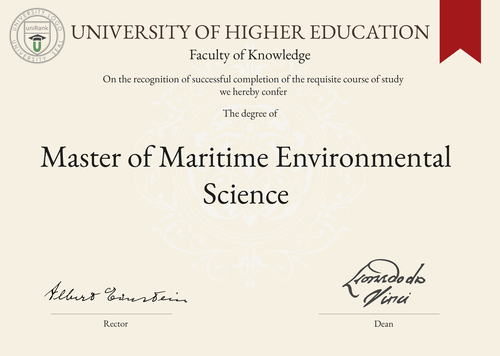
Master of Maritime Environmental Science (M.MES)
Guide to Master of Maritime Environmental Science Program/Course/Degree
Master of Maritime Environmental Science (M.MES)

Program Name:
Master of Maritime Environmental ScienceProgram or Degree abbreviation:
M.MESDuration range:
Varies by country and universityTuition range:
Varies by country and universityOverview:
The Master of Maritime Environmental Science program is designed to provide students with a comprehensive understanding of the environmental issues and challenges faced in the maritime industry. This program combines scientific knowledge with practical skills to address the complex environmental issues related to marine ecosystems, pollution, climate change and sustainable maritime practices.Curriculum Overview by year:
The curriculum of the Master of Maritime Environmental Science program is structured to cover a wide range of topics over the course of study. The specific courses may vary depending on the university and country, but typically include: Year 1: - Introduction to Maritime Environmental Science - Marine Ecology and Conservation - Environmental Impact Assessment - Oceanography and Climate Change - Maritime Pollution Control Year 2: - Sustainable Maritime Practices - Coastal Zone Management - Marine Policy and Governance - Research Methods in Environmental Science - Thesis or Capstone ProjectKey Components:
The key components of the Master of Maritime Environmental Science program include a strong foundation in environmental science, specialized knowledge in maritime issues, practical skills in data collection and analysis and an understanding of policy and governance related to the maritime industry.Career Prospects:
Graduates of the Master of Maritime Environmental Science program can pursue various career opportunities in both the public and private sectors. Potential career paths include environmental consulting, marine research, government agencies, non-profit organizations and maritime industries. Graduates can work as environmental scientists, marine biologists, policy analysts, sustainability managers, or research scientists.Salary Expectations:
Salary expectations for graduates of the Master of Maritime Environmental Science program can vary depending on factors such as location, industry and level of experience. Generally, professionals in this field can earn competitive salaries, with the potential for growth as they gain more experience and expertise. For a more accurate understanding of salary expectations, you can utilize the Job Sites Search Engine, from our sister site jobRank, which searches over 4,600 job sites worldwide. Make sure to specify not only the job title but also the country you are interested in.Conclusions:
It is important to note that the duration, tuition fees, curriculum, key components, career prospects and salary expectations of the Master of Maritime Environmental Science program can vary depending on the country and university chosen for study. Prospective students are advised to research and compare different programs to find the one that best suits their interests and goals. Visitors can search for where this specific degree, Master of Maritime Environmental Science, is offered anywhere in the world through the uniRank World Universities Search Engine.World Universities Search Engine
search for Master of Maritime Environmental Science (M.MES) and add the Location (country, state etc.) or specific University you are interested in studying at.
Query examples:
- Master of Maritime Environmental Science (M.MES) United States
- Master of Maritime Environmental Science (M.MES) United Kingdom online
- Master of Maritime Environmental Science (M.MES) Australia international students
- Master of Maritime Environmental Science (M.MES) University of California
- Master of Maritime Environmental Science (M.MES) University of London tuition fees
- Master of Maritime Environmental Science (M.MES) University of Sydney scholarships
Share Program/Course
Interesting? Share this program/course/degree info with your friends now.